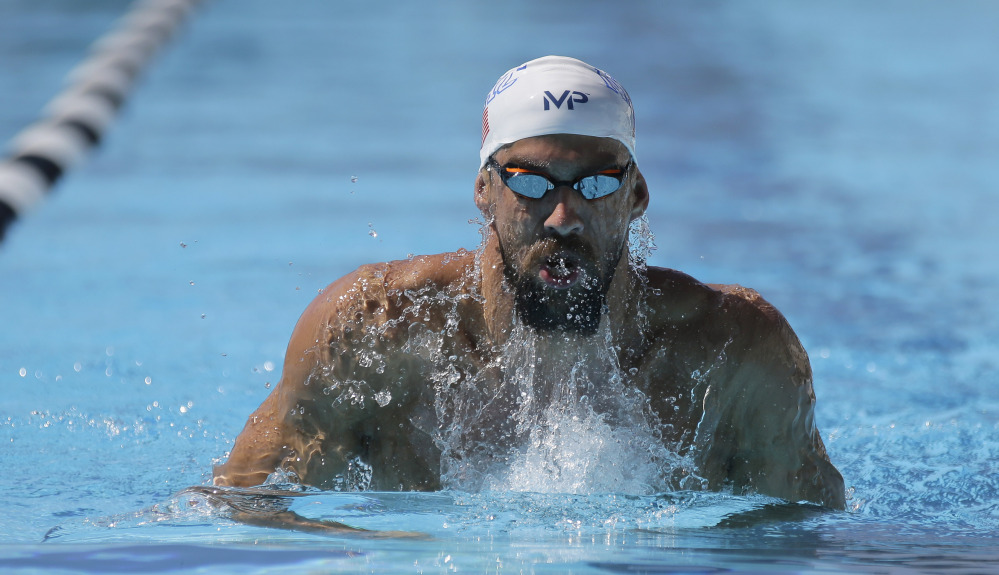Michael Phelps is still focused on going fast in the pool.
Outside the water, he’s made some big changes.
The winningest athlete in Olympic history will be competing this week at the U.S. championships in San Antonio — basically, a backup meet for all those American swimmers who didn’t qualify for the world championships in Kazan, Russia.
Actually, Phelps did claim a spot on the team. But, after his second drunken driving arrest last September, USA Swimming issued a six-month suspension and took away his trip to Russia.
“Obviously, I’d like to be competing at worlds,” Phelps said. “But this is what I have to do.”
There were other things he needed to do, as well.
Phelps underwent 45 days of inpatient treatment, enrolled in Alcoholics Anonymous, and decided that he needed to get drinking out of his life, at least in the short term.
“Before I even went to court, I said to myself that I’m not going to drink until after Rio — if I ever drink again,” he said. “That was a decision I made for myself. I’m being honest with myself. Going into 2008 and 2012, I didn’t do that. I didn’t say I was going to take a year off from drinking and not have a drink.”
Phelps, who has won 18 golds and 22 medals overall at the last three Olympics, retired from swimming after the 2012 London Games, saying he had no goals left to accomplish and didn’t want to still be competing into his 30s. That decision lasted barely a year. By the following summer, he was itching to race again.
Now, after enduring another bump in his personal life, he’s determined to end his swimming career on a high note. That means staying clean and sober.
“If I’m going to come back, I need to do this the right way,” Phelps said. “I’ve got to put my body in the best physical shape I can possibly get it in. Is it a challenge? No. I go to bed earlier. I sleep more. I wake up every day and have a completely clear head. I don’t feel like my head went through a brick wall. There are so many positives to it.
“Are there days I’m sitting on the golf course or sitting on my roof (patio) and would like to have a beer? Yeah. But I have a year left in my career. If I really want it bad enough, I will make that sacrifice.”
Phelps is eager to see what kind of times he can post in San Antonio, saying he “has not been in this kind of shape in a long, long time. Maybe not ever.” He’s scheduled to swim four events: the 100- and 200-meter butterfly, the 200 individual medley, and the 200 breaststroke.
The breaststroke is simply a workout, something to do on the final day of the meet Monday. But those other three are his best events, the ones he’s clearly eyeing for the Rio Olympics. While Phelps figures to be the class of the field in San Antonio, he’ll be eager to compare his times to the ones being put up in Kazan, where the eight-day swimming competition began Sunday.
“Of course, it’s going to motivate me,” Phelps said. “I don’t want to be No. 2. I don’t want to be No. 3. I can’t stand it. Sure, this is different. But it’s still the end of the (season), and I’d like to put up some No. 1 times in the world.”
Phelps won’t be the only Olympic gold medalist in San Antonio. Training partner Allison Schmitt, one of the biggest stars of the 2012 London Games, failed to qualify for the last two world championships and finally went public this year with her battle against depression. She hopes the nationals will show that her life and swimming career are back on track with the Rio Games just a year away.
Cullen Jones, a four-time Olympic medalist, will also be at nationals, along with Dana Vollmer, who has four Olympic golds and recently returned to competition after the birth of her first child.
But all eyes will be on Phelps, who seems to have taken his life in a different direction away from the pool. He’s engaged to be married, celebrated his 30th birthday at the end of June, and has thrown himself fully into training for what he said will surely be his final Olympics.
“I don’t go to bed at night worrying about what I’m going to find in the morning,” said Bob Bowman, the swimmer’s longtime coach. “That wasn’t always the case.”
Phelps said therapy helped him uncover and address some of the issues weighing down his seemingly perfect life.
“I feel like people think I’m more approachable now than I ever was,” he said. “I feel like I am OK and I am happy with who I am. I feel like I’ve learned so much about myself, who I truly am. I can honestly say there aren’t many people in this world who have seen who I really am.”
Send questions/comments to the editors.


